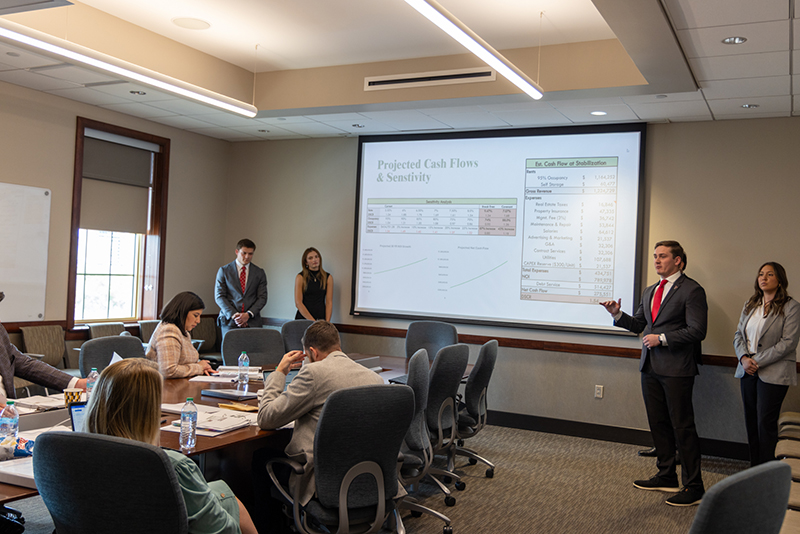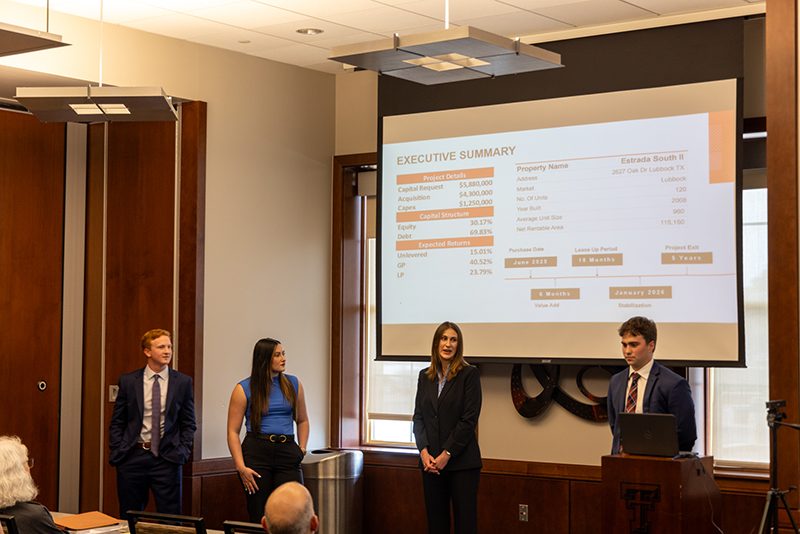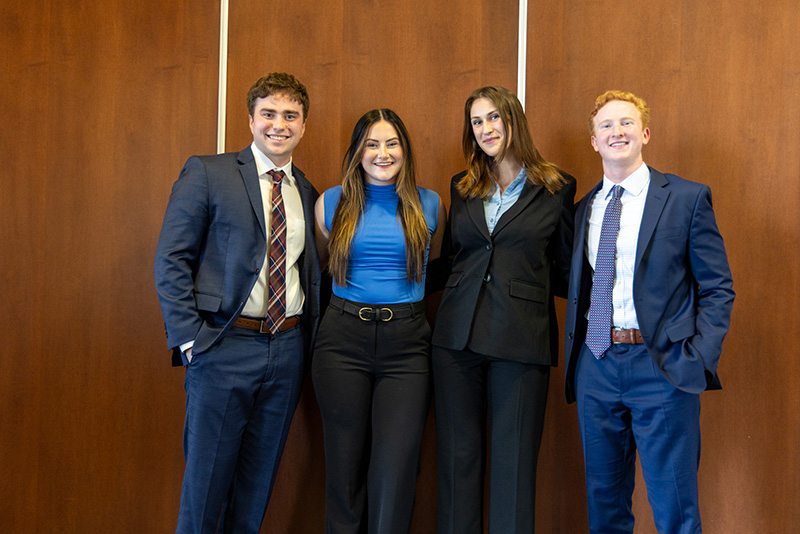Before 2020, Jared Harrell, director of the Rawls College Center for Real Estate, took the college's real estate students to compete in various competitions against other universities. However, that changed when the COVID-19 pandemic hit, and social distancing became necessary.
In 2023, Harrell realized the real estate competitions his students previously participated in were not the same post-pandemic. He then decided Rawls College would not only be the one to bring the real estate competitions back to their former glory, but even better.
Knowing that real estate is nothing without bankers, and vice versa, he reached out to his fellow faculty members and Director of the Excellence in Banking Program, Mike Mauldin.
“You really can’t have a bank without dealing in real estate,” said Mauldin.
Mauldin and Harrell had a big vision for future iterations of the competitions and, as of 2025, they turned that vision into reality.
How It’s Going

For the banking and real estate duo, the competition is more than utilizing hypothetical scenarios to educate students. Their aim is to help students develop essential skills, apply classroom knowledge to real-world challenges, and gain confidence in themselves.
To begin, they invited industry professionals to judge the students to ensure a fair process and to provide a real-world experience.
The six-person judging panel consisted of two judges from a software company, two real estate judges, and two banking judges.
PlainsCapital Bank and S2 Capital supported the competition by providing monetary prizes for winners and participants.
The competition’s evolution allows students opportunities to look at an assigned property, consult with industry mentors, and gather insights from marketing professionals.
“This hands-on approach, combined with the mentorship experience, helps students develop a practical understanding of the decision-making processes that real estate and banking professionals navigate daily,” said Harrell.
Challenge Accepted
This year, the case study challenged students to evaluate the feasibility of acquiring and renovating Estrada South II, a value-add property located in Lubbock.
“One significant factor in their analysis was the property’s Land Use Restriction Agreement (LURA), which imposes income restrictions on affordable housing units,” said Harrell, emphasizing its influence on financing and long-term investment strategy.
In response, students prepared a balanced investment strategy that addressed Lubbock’s affordable housing needs while ensuring sustainable financial returns.

Anastasiia Khrustaleva, one of the winners of this year’s competition, shared her thoughts on the challenges her team faced during the process. “The hardest part was definitely getting started—figuring out the model structure and defining our assumptions in a realistic but competitive way,” she said.
A total of 55 students participated in this year’s event, competing in 12 teams—six in the Undergraduate Division and six in the Graduate Division.
To ensure students were properly equipped, a trainer from Trepp, a software company, conducted specialized sessions on using market research, financial modeling, and risk analysis. Grant Roehm of Keller Williams Commercial, the listing agent for Estrada South II, then led students on an on-site property visit, where they could apply their newly acquired skills.
In addition, each team worked with a commercial banker from CityBank who served as their industry mentor and provided information and resources to help them succeed.
In the end, these mentors also completed a survey assessing the students, which factored into the judges’ final analysis of each team’s abilities.
After training and site visits, each team prepared a comprehensive summary, a detailed proforma model, and supporting presentation slides they would present to the judging panel.
The judges evaluated each presentation based on a variety of factors such as market analysis and research, financial feasibility, problem solving, presentation delivery, and the students’ responses to questions.
The winner of each division advanced to the live final stage where an audience of faculty and industry professionals voted to choose the winner.
Going Live and Taking Home the Victory
Thursday, March 27, the live finals took place in the McCoy Atrium of the Rawls College of Business, where two teams from each division competed for the $1,250 prize, showcasing their well-researched proposals and demonstrating their capabilities in front of industry leaders.
At the conclusion of the presentations, local business leaders and industry professionals from McDougal Companies, CityBank, and Trepp, along with Rawls College faculty, cast their votes for the winners.
Graduate Division Winners
- 1st Place ($750): Team 11 — Live Finals Winner ($500 bonus)
Hope Flournoy, Hudson Freedle, Jared Hoffman, Anastasiia Khrustaleva
CityBank Mentor: Armando Avila - 2nd Place ($500): Team 12
Sarah Auer, Nick Gonzaga, Maria Jose Sanchez, Varshini Suresh
CityBank Mentor: Aaron Mendoza - 3rd Place ($250): Team 7
Jake Duvall, Evan Emery, Samantha Lupul
CityBank Mentor: Chris Capshaw
Undergraduate Division Winners
- 1st Place ($750): Team 4 — Live Finals Runner-Up ($250 bonus)
Cameron Anderson, Paola Rodriguez, Elizabeth Hamilton, Luke Ingram, Byren Nelson, Jason Shannon
CityBank Mentor: Eric Sansom - 2nd Place ($500): Team 1
Arianna Cannon, Charles Haubein, Thu Oo, Kendall Perez, Benjamin Reed Pierce, Lauren Wells
CityBank Mentor: Steve Lewis - 3rd Place ($250): Team 6
Carson Cody, Seth Flores, Abigail Gillam, Matilyn Gonzalez, Ben Lashaway
CityBank Mentor: Braeden Pittman
The winning team, composed of current Rawls College master’s students, designated specific roles to each member in their group.
Jared Hoffman reflected on the group’s commitment and time investment throughout the competition.
“We put in somewhere between 20 to 25 hours overall and met twice a week—Tuesdays and Thursdays—for about 90 minutes each session,” he said.

While their effort paid off in the end, Hope Flournoy says their strategy aided them in standing out among the competition.
“We focused on the appeal of our presentation and told a compelling story of what the property could become,” she said.
Anastasiia Khrustaleva says the real-life application helped her learn a lot about varying information needs for different people involved throughout the project.
“This competition was a great bridge between theory and practice,” she said. “It also helped me understand how to present a deal to different stakeholders with different priorities.”
The Future is Bright
This competition is a testament to the dedication of these programs to prepare Rawls College students for real-world success.
“Every year we learn how to make it a little bit better and how to coach them better,” said Mauldin.
With each competition, Rawls College improves the future for real estate and banking.
